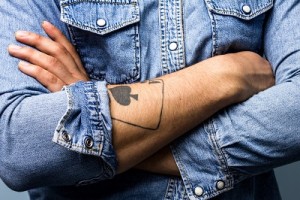- Calls to this hotline are currently being directed to Within Health, Fay or Eating Disorder Solutions
- Representatives are standing by 24/7 to help answer your questions
- All calls are confidential and HIPAA compliant
- There is no obligation or cost to call
- Eating Disorder Hope does not receive any commissions or fees dependent upon which provider you select
- Additional treatment providers are located on our directory or samhsa.gov
Males, Media and Body Image
Contributor: Jacquelyn Ekern, MS, LPC.
 The Marlboro Man, Super Man and Abercrombie & Fitch all have influenced societal perceptions of manhood. Males are under increasing pressure from the constant onslaught of media images. These images of chiseled, lean and muscular males imply that men who do not fit this description should change or improve to be more fit.
The Marlboro Man, Super Man and Abercrombie & Fitch all have influenced societal perceptions of manhood. Males are under increasing pressure from the constant onslaught of media images. These images of chiseled, lean and muscular males imply that men who do not fit this description should change or improve to be more fit.
Most boys and men want to feel and project power, strength, independence, and masculinity. The internet, television, radio and billboard ads that they are bombarded with daily have plenty of suggestions and guidance on how to achieve this powerful male image.
Sadly, if the media is our guide, then the vast majority of male bodies are not adequate – not thin enough, not “cut” enough and certainly lacking the essential 6 pack abs. So, no wonder it is estimated that 15% to 43% of males are unhappy with their bodies1.
Influential Media Messages
Media messages are often carefully crafted to create a need and then promote their product or service as the answer to that need. For example, if men are convinced that they need to have washboard abs to be attractive to females, then the muscle building supplement that is promoted alongside the buff model with the abs extraordinaire is obviously the solution!
It is presented as a simple equation:
Need to be attractive to females + Muscle supplement = love and success in romantic relationships
The Constant Cycle of Looking for the “Best” Product
 This advertising scheme works great for the advertisers as their profits go up and their pockets are lined. The consumer may even feel gratitude that such a fine product has been developed to help them meet their needs to be physically acceptable and desirable.
This advertising scheme works great for the advertisers as their profits go up and their pockets are lined. The consumer may even feel gratitude that such a fine product has been developed to help them meet their needs to be physically acceptable and desirable.
But, when the consumer finds that simply taking the daily pill does not indeed reduce their body fat and result in highly developed muscles, they often give up the regime and are off to find another answer to this heavily media fed need to be more muscular and lean.
The Attractive Man Is the Successful Man
Aside from attractiveness, the media often portrays the successful male businessman, family man or respected leader as fit, lean and preferably, buff. Thus, the typical male in our society is somewhat brainwashed by advertisers to believe that they will be more respected, admired and rewarded if they maintain a physically fit body that appears both muscular and lean.
In the workforce, men (and women) commonly run across unfair biases that their weight and fitness level are an indicator of their work ethic, discipline, and self-restraint. Hence, the college graduate showing up to a room full of interviewees for the same position, may compare his build to the others and size up his potential of winning the job based on how favorably he compares in lean muscle mass to the others.
Trivializing Ourselves Because of Our Appearance
 When taken out of context, this sounds crazy, as we all know education, experience, age, connections, etc. also have significant influence over who wins a job out of a pool of applicants. But, it is sad to realize that this lean / muscular body is also considered an advantage to those competing for jobs.
When taken out of context, this sounds crazy, as we all know education, experience, age, connections, etc. also have significant influence over who wins a job out of a pool of applicants. But, it is sad to realize that this lean / muscular body is also considered an advantage to those competing for jobs.
It is great to be healthy and feel good about yourself! No argument there. But, it is sad that some of us trivialize the enormous value of our unique selves when we simply evaluate ourselves by our appearance.
So, what can the Average Joe do to bolster and protect his body image?
- Be a wise consumer of the media. Question what is their objective? Are they trying to create a need or sell you something?
- Avoid weight obsession. Refuse to allow your weight to determine how you feel about yourself. Stay off the scales!
- Look inward for character attributes and living a life congruent with your values as a measure of your success, not your appearance.
Evaluating and Understanding Media’s Role
In summary, the media is not an evil entity out to corrupt the self-esteem of males. It is simply a societal construct designed to assist us in promoting ideas, values, products, services and other things that our society deems of value.
It is wise for our boys and men to carefully evaluate the media advertisements they are exposed to and to question the validity of the message. A balance between a healthy focus on fitness and a strong self-esteem built upon the individual’s gifts, talents, and unique being is likely the best offense against unhealthy media influence on the male body image.
Community Discussion – Share your thoughts here!
What are your thoughts about the media’s influence on male body image?
References:
- Statistics on Males and Eating Disorders | National Eating Disorders Association. (n.d.). Retrieved April 22, 2015, from https://www.nationaleatingdisorders.org/statistics-males-and-eating-disorders
- Schooler, D., & Ward, L. (2005, July 25). Average Joes: Men’s Relationships With Media, Real Bodies, and Sexuality. Retrieved April 22, 2015, from http://shrike.depaul.edu/~ztan/psy326/men7127.pdf
- Get Real: Digital Media Literacy Toolkit. (n.d.). Retrieved April 22, 2015, from http://www.nationaleatingdisorders.org/sites/default/files/Toolkits/GetRealToolkit.pdf
- Validation of a Six-Item Male Body Image Concerns Scale (MBICS). (2014, June 25). Retrieved April 22, 2015, from http://www.tandfonline.com/doi/abs/10.1080/10640266.2014.925768?url_ver=Z39.88-2003&rfr_id=ori:rid:crossref.org&rfr_dat=cr_pub=pubmed&#;.VTbpMCHBzGc
- Gallant, P. (n.d.). Males’ Body Image and Eating Disorders: An Increasing Concern. Retrieved April 22, 2015, from http://nedic.ca/males-body-image-and-eating-disorders-increasing-concern
Last Updated & Reviewed By: Jacquelyn Ekern, MS, LPC on April 28th, 2015
Published on EatingDisorderHope.com

